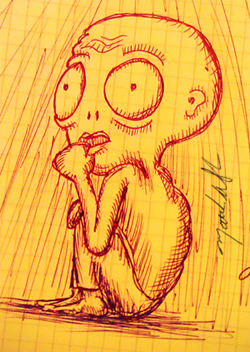Opening Up Like a Man
by Matthew Alexander Sloane

In a past relationship I got some feedback on the way I came across to my partner as a 30 year-old, powerless child. At the time, I thought I was being vulnerable and sharing openly about my feelings.
She told me something I will never forget. “I have no problem with you telling me when you’re going through a hard time,” she said. “It’s just that you sound like a child when you’re talking.”
She was right.
I recall complaining to her once about how I wasn’t getting the salary I deserved. Anyone listening to my tone might have thought they were hearing a 10-yr old mope about the low grade he got from his teacher at school. Not good for the partner sharing her life with me, and not good for me—the young man who so desperately wanted respect.
I’m not saying there’s no room to let that young part of me be seen in relationship. I am saying, I do want to be conscious of who in me I am talking from. My partner can’t always be my go-to shoulder to cry on, and thankfully, there is an alternative.
For the sake of this article, let’s say there are a few parts of me like:
– my child self
– my adult self
– my higher self
I got laid off a few years ago and the child self said to me, “how could they do this to me? I don’t know what I’m going to do!” Can you feel the blame and fear in those statements? The potential for depression? Then, shortly thereafter, the adult part of me said, “okay, I am concerned about this and I need to take action. Let me see how I can gather some support.” Rational and relational, the adult recognized that the time had come to take care of myself by reaching out for help.
My higher self is the boring one. Only because it pretty much says the same thing—probably because I keep needing to hear it to stay on my path : It says something like, “no matter what happened yesterday, what happens today, or what happens tomorrow, you are worthy of having a good life.” And, “anything is possible, just keep following your heart, rest in the not-knowing, and don’t forget to find a way to have fun every
day.”
Pretty nice, huh? All possibility, ponies, rainbows, and not so much focus on crisis.
I used to share with my past partner as my child or my higher self. Whining like a baby with a bloody tooth or preaching from on-high like a pastor with no worries. However, what she and I were both missing was an adult self that spoke with love.
“I want you to share yourself and open up,” she would say. “But just do it like a man.” Those words have guided me to have a better impact on myself as well as my current partner. The simple approach I eventually allowed myself has helped me become more confident, happier, and more adventurous.
In the getting laid off example, I felt those depressed child feelings come up really strong. I even did a little journaling to release the initial charge of it all—to distance myself from that voice so that I could really hear it instead of being overwhelmed by it. When I talk with my current partner, I know I have a choice about my presentation—which voice I am speaking from.
For the sake of the distinction, let’s imagine how the following phrase could be uttered as a child or an adult,… one at a time.
Child
First like a child moping, head hanging low, chest caving in, mumbling slowly with sagging lips, a low monotone volume and barely alive who says, “honey, to be honest I’m not sure what I’m going to do. I don’t think I could do that job again even if I could find that job. So I’m planning on talking to some friends and colleagues about what I can do next.”
Yup — that’s how I used to do it. That approach felt terrible to me and to my past partner.
Adult
Then again, imagine the same statement coming from the adult part, with a straight back, enunciating words crisply with a little more volume, and conviction, “honey, to be honest I’m not sure what I’m going to do. I don’t think I could do that job again even if I could find that job. So I’m planning on talking to some friends and colleagues about what I can do next.”
Same words, different feel altogether.
That’s how I’ve been learning to do it. This way of speaking still requires some conscious effort on my part because it’s not always my default. Sometimes, the child in me wants to be held, cuddled, and told everything is going to be all right by my partner, even in the midst of a lot of unknowns. There are times that I might actually feel so broken by the world, that I feel I can only muster that sort of opening up. And I do want that option with my partner. Letting the other be totally vulnerable is a way we feel very close as well.
Other times, I choose to let the child’s fear and depression exist while another part of me perks up.
It’s not that one way is better than the other, it’s simply that I want choices. I want to be able to get into my child at times and I want to get into my adult at other times. If you used your imagination in the example above, you have a sense of that distinction: opening up like a child or opening up like a man. It’s subtle, but it goes a long way.
One is giving up responsibility and the possibility of self-empowerment. The other is taking responsibility, taking care of your self and those you love, including that child inside. This is not just about how you come across to your partner. It’s how you come across to yourself and how willing you are to be with that child in you.
To let it know that the adult in you is going to make everything okay even in the midst of a lot of unknowns.
Questions
How do you relate to that child and the adult in you? Have you made one wrong and the other right? Can they co-exist? How do you choose the voice you share with and which part it is coming from?
In co-creation,
Matthew Alexander Sloane
– is a deeply personal issue that everyone decides for himself. Sometimes the price is high, sometimes low. But this is not very important for life. Life is an interesting thing. And the price on Viagra – too.


